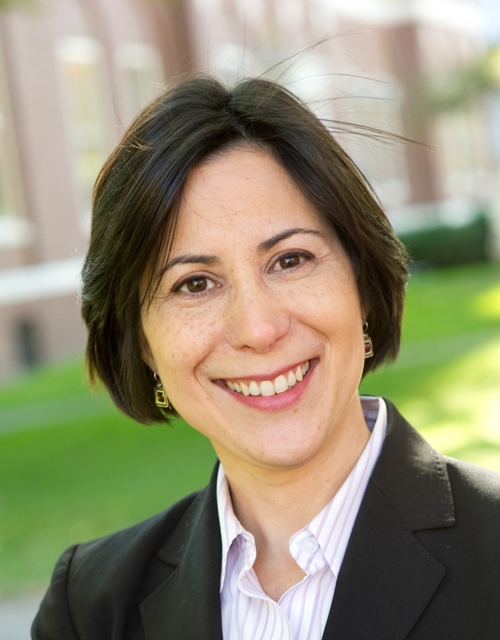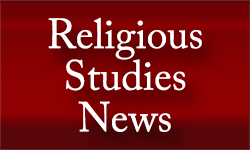|
 Mayra Rivera is an associate professor of theology and Latina/o Studies at Harvard Divinity School. She earned her PhD from Drew University, New Jersey. Her transdisciplinary work in critical theological studies engages key Christian themes in relation to current theory and philosophy. Rivera's work also analyzes the role of religious ideas in Latina theory. She is author of The Touch of Transcendence: A Postcolonial Theology of God (WJK Press, 2007). She is also coeditor, with Stephen Moore, of Planetary Loves: Spivak, Postcoloniality, and Theology (Fordham University Press, 2010) and, with Catherine Keller and Michael Nausner, of Postcolonial Theologies: Divinity and Empire (Chalice Press, 2004). Mayra Rivera is an associate professor of theology and Latina/o Studies at Harvard Divinity School. She earned her PhD from Drew University, New Jersey. Her transdisciplinary work in critical theological studies engages key Christian themes in relation to current theory and philosophy. Rivera's work also analyzes the role of religious ideas in Latina theory. She is author of The Touch of Transcendence: A Postcolonial Theology of God (WJK Press, 2007). She is also coeditor, with Stephen Moore, of Planetary Loves: Spivak, Postcoloniality, and Theology (Fordham University Press, 2010) and, with Catherine Keller and Michael Nausner, of Postcolonial Theologies: Divinity and Empire (Chalice Press, 2004).
Rivera has served in various leadership roles at the AAR, including cochair of the Theology and Religious Reflection Section (2008–2010), and member of the steering committees for Latina/o Critical and Comparative Studies Group (2009–2012), Theology, Bible, Postmodernity Group (2006–2009), and Latina/o Religion, Culture, and Society Group (2004–2008). She has also served as jury member for the AAR Book Award for Excellence in the Study of Religion and was chosen as a fellow of the AAR/Luce Summer Seminar on Theologies of Religious Pluralism and Comparative Theology.
Statement on the AAR
I have been an active member of the AAR since my graduate school years, and thus quite familiar with the myriad of ways in which the organization supports the interests of its members. The organization has played a prominent and important role in my own professional development at every stage of my career. Like many of you, invaluable opportunities to present and respond to work in my areas of research and interest propelled my own work forward. The employment center and meetings and seminars keep me abreast of current events and trends within the guild. And as a regular session organizer, I cherish such opportunities to enter into dialogue with scholars of similar interests from across the country. The AAR has made so much possible. These are just a few of the reasons why I continue to give back to the organization by assuming varying leadership roles and mentoring graduate students as well as junior faculty members just entering the job ranks. More importantly, this is why I want to expand my role of service as a member of the Board of Directors.
As at-large director, my primary role would be representing the concerns of AAR members to the Board, not least those of marginalized voices. The relationships I have established with scholars in many areas and what I have learned through my leadership work with various groups through the years would inform my contributions. For instance, my participation in a variety of programs at the AAR has exposed me to its increasing diversity and its crucial contributions to the organizations’ missions, as well as to the challenges of creating meaningful conversations across groups, disciplines, and interests. I am especially interested in helping the AAR offer spaces for those conversations in ways that also strengthen its commitment to diversity in all areas.
As a professor at an institution that serves undergraduate, masters, and PhD students, one that offers professional ministerial degrees as well as academic degrees in the study of religion, I appreciate the challenges of addressing the different interests represented by these groups and the teachers who serve them. I am interested in the programs to promote effective teaching as well as in those that focus on scholarly research and publication—and would be attentive to needs in both areas. And as at-large director I would make sure that all scholars from adjunct to tenured, from liberal arts to research universities, and from theology to the social sciences know that their particular concerns are being heard.
I am grateful for the nomination and welcome this opportunity to continue to serve this valuable organization.
|
 Josef Sorett is an assistant professor of religion and African American studies at Columbia University. He received his PhD in African American studies from Harvard University, a BS from Oral Roberts University, and an MDiv from Boston University. As an interdisciplinary scholar of religion and race in the Americas, Sorett employs historical and literary approaches to the study of religion in black communities and cultures in the United States. He has received support for his research from several institutions, including the Louisville Institute, the Fund for Theological Education, and the Woodrow Wilson National Fellowship Foundation. His scholarship has been published in Culture and Religion, Callaloo, and Pneuma: Journal of the Society for Pentecostal Studies. He has also written for such popular media outlets as the New York Times, The Root, and the Washington Post. Sorett is at work on two books: Spirit in the Dark: A Religious History of Racial Aesthetics, slated for publication with Oxford University Press; and an anthology tentatively titled, The Sexual Politics of Black Churches. He currently serves the AAR in two capacities; as cochair of the Afro-American Religious History Group steering committee, and as a member of the Committee for the Public Understanding of Religion. Josef Sorett is an assistant professor of religion and African American studies at Columbia University. He received his PhD in African American studies from Harvard University, a BS from Oral Roberts University, and an MDiv from Boston University. As an interdisciplinary scholar of religion and race in the Americas, Sorett employs historical and literary approaches to the study of religion in black communities and cultures in the United States. He has received support for his research from several institutions, including the Louisville Institute, the Fund for Theological Education, and the Woodrow Wilson National Fellowship Foundation. His scholarship has been published in Culture and Religion, Callaloo, and Pneuma: Journal of the Society for Pentecostal Studies. He has also written for such popular media outlets as the New York Times, The Root, and the Washington Post. Sorett is at work on two books: Spirit in the Dark: A Religious History of Racial Aesthetics, slated for publication with Oxford University Press; and an anthology tentatively titled, The Sexual Politics of Black Churches. He currently serves the AAR in two capacities; as cochair of the Afro-American Religious History Group steering committee, and as a member of the Committee for the Public Understanding of Religion.
Statement on the AAR
It is an honor to be nominated for an At-Large position on the AAR Board of Directors. I welcome the opportunity to serve in this role. I have been a member of the AAR for close to fifteen years now, beginning as a master’s student when I participated in an AAR/SBL Recruitment Conference for Racial and Ethnic Minorities in 1998. Subsequently I have benefited from presenting at several national meetings and serving on the Steering Committee for the Afro-American Religious History Group (first as graduate student representative, then committee member, and now as co-chair). Since 2012 I’ve also been a member of the Committee for the Public Understanding of Religion.
Several themes weigh most heavily on my mind as I consider the prospect of representing AAR’s membership in this capacity. First, I am interested in how AAR maintains generative relationships with the various publics that populate its membership roles, peruse its web resources, and attend its programs. As such, I would hope to encourage AAR’s continued efforts to create and sustain structures that equally support rigorous scholarship, intellectual creativity and innovation, and responsible public engagement. Second, and closely related, I remain committed to helping the organization lead on questions of equity and inclusion. This commitment stems, in part, from the fact I was first introduced to the organization through a program initiated to address questions of diversity in the profession. Certainly, this translates into encouraging and enhancing efforts to increase representation from the demographics most often associated with the rubric of “diversity” (i.e., race, religious affiliation, sexual orientation and gender identity) in AAR leadership and programs. Yet this also holds for the organization’s work within the profession more generally, across the multiple axes of our respective disciplines, identities, and institutions, as well as the varying forms of professional appointments that AAR members hold. In my estimation, such matters are important for our guild. Yet they also help to highlight challenges and opportunities that we—as scholars of religion, in particular—share with colleagues across our campuses, throughout the humanities and social sciences, and beyond. Additionally, while such “big ideas” provide the context for my thinking about AAR governance, I also bring to the table an extensive background in administrative and advisory roles with both academic and civic organizations. I believe that this more “practical” dimension of my experience would also be an asset to the AAR’s work. Finally, I hope to add to the Board the outlook of one relatively early in the professional pipeline, including the questions and concerns of a faculty person not too far along on the tenure track.
In conclusion, I’ve been fortunate to study and teach at a wide variety of institutions (religious-affiliated, public, and private) and in a number of intellectual settings (ethnic/area studies, seminary/divinity school, and academic study of religion). I believe that this range would enable me to bring a unique and valuable perspective to the Board of Directors; one informed by the breadth of experiences that makes all of our work with the AAR such a vital and rewarding, albeit challenging, undertaking. For all these reasons, I appreciate the nomination to serve as an At-Large Director. If elected, I look forward to the challenges and lessons that such service will no doubt provide.
|


 Mayra Rivera is an associate professor of theology and Latina/o Studies at Harvard Divinity School. She earned her PhD from Drew University, New Jersey. Her transdisciplinary work in critical theological studies engages key Christian themes in relation to current theory and philosophy. Rivera's work also analyzes the role of religious ideas in Latina theory. She is author of The Touch of Transcendence: A Postcolonial Theology of God (WJK Press, 2007). She is also coeditor, with Stephen Moore, of Planetary Loves: Spivak, Postcoloniality, and Theology (Fordham University Press, 2010) and, with Catherine Keller and Michael Nausner, of Postcolonial Theologies: Divinity and Empire (Chalice Press, 2004).
Mayra Rivera is an associate professor of theology and Latina/o Studies at Harvard Divinity School. She earned her PhD from Drew University, New Jersey. Her transdisciplinary work in critical theological studies engages key Christian themes in relation to current theory and philosophy. Rivera's work also analyzes the role of religious ideas in Latina theory. She is author of The Touch of Transcendence: A Postcolonial Theology of God (WJK Press, 2007). She is also coeditor, with Stephen Moore, of Planetary Loves: Spivak, Postcoloniality, and Theology (Fordham University Press, 2010) and, with Catherine Keller and Michael Nausner, of Postcolonial Theologies: Divinity and Empire (Chalice Press, 2004). Josef Sorett is an assistant professor of religion and African American studies at Columbia University. He received his PhD in African American studies from Harvard University, a BS from Oral Roberts University, and an MDiv from Boston University. As an interdisciplinary scholar of religion and race in the Americas, Sorett employs historical and literary approaches to the study of religion in black communities and cultures in the United States. He has received support for his research from several institutions, including the Louisville Institute, the Fund for Theological Education, and the Woodrow Wilson National Fellowship Foundation. His scholarship has been published in Culture and Religion, Callaloo, and Pneuma: Journal of the Society for Pentecostal Studies. He has also written for such popular media outlets as the New York Times, The Root, and the Washington Post. Sorett is at work on two books: Spirit in the Dark: A Religious History of Racial Aesthetics, slated for publication with Oxford University Press; and an anthology tentatively titled, The Sexual Politics of Black Churches. He currently serves the AAR in two capacities; as cochair of the Afro-American Religious History Group steering committee, and as a member of the Committee for the Public Understanding of Religion.
Josef Sorett is an assistant professor of religion and African American studies at Columbia University. He received his PhD in African American studies from Harvard University, a BS from Oral Roberts University, and an MDiv from Boston University. As an interdisciplinary scholar of religion and race in the Americas, Sorett employs historical and literary approaches to the study of religion in black communities and cultures in the United States. He has received support for his research from several institutions, including the Louisville Institute, the Fund for Theological Education, and the Woodrow Wilson National Fellowship Foundation. His scholarship has been published in Culture and Religion, Callaloo, and Pneuma: Journal of the Society for Pentecostal Studies. He has also written for such popular media outlets as the New York Times, The Root, and the Washington Post. Sorett is at work on two books: Spirit in the Dark: A Religious History of Racial Aesthetics, slated for publication with Oxford University Press; and an anthology tentatively titled, The Sexual Politics of Black Churches. He currently serves the AAR in two capacities; as cochair of the Afro-American Religious History Group steering committee, and as a member of the Committee for the Public Understanding of Religion.